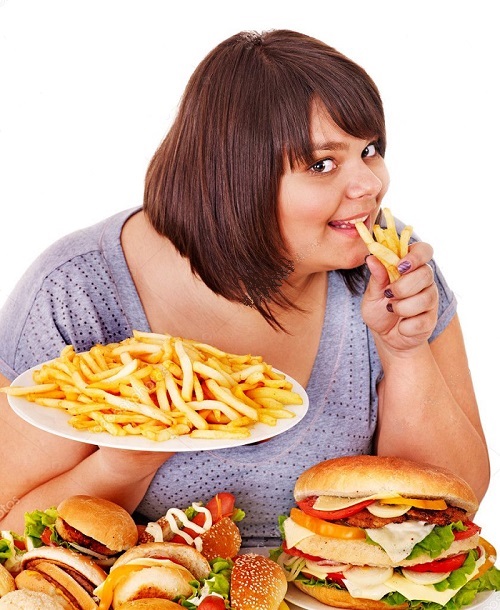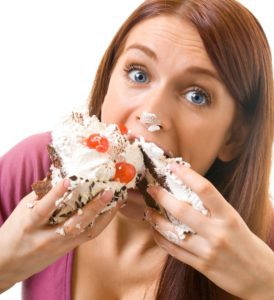No I don’t think food is my problem…

“Shock Horror! Are You Saying I Might Be a Food Addict?”
We all have moments when we feel angry, stressed and vulnerable…
What exactly is food addiction?
It is similar to several other eating disorders.
Including binge eating disorder, bulimia, compulsive overeating.
Food addiction is an unhealthy relationship with food…
What causes food addiction?
Consuming “highly palatable” foods which are emotionally comforting.
Manufactured foods are designed to be emotionally comfort foods.
The combination of high carbohydrates, fat, salt, sugar, artificial sweeteners!
They play a role in triggering pleasure centers of the brain…
And release “feel-good” chemicals dopamine and serotonin.
Yes, and the underlying issues are triggered by deep emotions.
Here’s a quick look at my own uninvited scary thoughts:
- I could only make love with lights off
- Sometimes anxiety doesn’t subside
- I’d eat to the point of feeling ill
- Constantly worry if I’m good enough
- Confused and often feel no motivation
- Overwhelmed by simplest of tasks
- Worrying if my depression is out of control
- Obsessed trying to be good wife, adult, parent
- Making sure everyone is cared for before me
- Scared to talk about how I really feel
- Don’t know who I am outside of being a mother
- Have rage which comes out of nowhere
- Don’t want to be judged
- Feels like I’m failing doing everything
- Don’t know how to let go of anger
- Feels like I can’t trust a single soul
- Almost always wear the same clothes
- Haven’t worn makeup in months
- Need to take care of myself but I feel guilty
- Feels like I’m drowning (literally gasping for air)
- I need support but won’t ask or accept it
- I put too much pressure on myself
- When I’m in a bad mood I binge eat alone
- Keep eating food even if I was no longer hungry
- I’d always crunch angrily on a big bag of chips
The truth is…
I’d always worry about not eating certain types of foods.
I’d also worry about cutting down on certain types of foods.
And it terrified me when certain foods weren’t available…
I would sneak out and go out of my way to get them.
Food addiction and binge eating are invisible, subtle and progressive.
What if food addiction is left untreated?
Being overweight could develop into disease as a result:
- Obesity
- Diabetes
- Heart disease
- Fatty liver disease
And for me, the personal consequences took its toll.
I had to get help because my mental health was deteriorating.
I was genuinely scared and terrified I was going to lose my sanity.
What is food addiction?
Food is essential to survival and is an important aspect of wellness.
In addition, a means of pleasure and enjoyment.
Food addiction is also a preoccupation with food…
The person finds themselves chronically thinking about food.
Worried about it, planning around it, and obviously eating it.
In addition, a person with food addiction typically uses food to manage emotions.
Turning to food to manage negative emotions such as:
- Sadness
- Anxiety
- Anger
- Boredom
- Loneliness
- Frustration
Did you know certain foods can overtake and control a person?
To the point where they can be distracted from people in their lives.
And lose sight of their responsibilities.
Be more interested in thinking and talking about food than other topics.
People with food addiction may find themselves trapped…
And needing to eat more to get the same emotional effects.
They may also become obsessed.
Focused on food and planning to eat food.
Matter of fact with little of inconveniencing other people.
Because their need to eat is a priority…
It’s almost like a ritual to eat at certain times or at certain places.
People with food addictions may find themselves eating more often.
And needing to eat more food to get same emotional effects.
Certain foods can have bring comfort, numbing or negative effect.
And may even experience withdrawal symptoms such as:
- Headaches
- Irritability
- Loss of concentration
Especially when they cut out certain foods like refined sugar.
They will often describe craving food…
Having made repeated attempts to try and beat their addiction.
And not being able to succeed.
For people with a food addiction…
Food often starts as a reward.
Eat and then feel good.
And then can jump off the rails with food being used to avoid a bad feeling.
Eat so you won’t feel bad.
That’s when food tends to get “stuck” as something that feels like an addiction.
What’s the difference between food addiction or other types of addictions?
The key difference between food addiction…
And other types of addictions is that all of us have to eat.
When talking about other addictions like drugs and alcohol…
Remember a person can live without drugs and alcohol.
The goal in for most treatments of many addictions…
Particularly drugs and alcohol is typically abstinence.
Which is an impossible goal in food addiction.
In addition, other addictions, particularly drugs and alcohol…
And this might result in more physiological changes in the brain.
Causing dangerous withdrawal.
While food addiction can be harmful to health.
Namely unintentional weight gain…
Unintentional weight gain is a result of putting on weight.
All without increasing your consumption of food or liquid.
And without decreasing your activity.
This happens when you’re not trying to gain weight.
And the impact could be higher cholesterol and triglyceride levels.
The daily and necessary nature of eating…
Makes managing these symptoms uniquely challenging.
And it has implications for how to manage food addiction.
What is the difference between food addiction and emotional eating?
Emotional eating is a pattern of regularly eating in response to emotions…
Typically negative or distressing emotions (e.g. sadness, frustration, anger).
Emotional eaters may not experience the same level of preoccupation.
Sometimes it’s really obvious someone has a food addiction…
Emotional eaters may not feel the same level of “high” from the foods.
And instead may claim the foods distracts or numbs them.
There is a great deal of overlap.
And in some ways emotional eating is a symptom of food addiction.
Although there emotional eaters who don’t experience same impact.
Or levels of preoccupation with rewards from food.
What are some signs/symptoms of food addiction?
Preoccupation with food…
Including planning your schedule largely around food.
Spending significant amounts of time thinking about or consuming food.
This time can be better spent in other activities which may decrease.
Needing to eat more and more over time to get the same emotional “fix.”
This can be needing to eat more to get same level of emotional numbing.
It could also be the same level of emotional reward.
Using food to manage emotions, both positive and negative emotions…
Using food as a way to manage negative emotions (sadness, anxiety, anger).
Using food as a distraction from states such as loneliness or boredom.
Food is also relied upon to celebrate…
And recall and show respect for good events or good feelings.
Relying and becoming distracted by food…
And food-related issues could make us feel less engaged in life.
Not as engaged with family, friends, partner, children or co-workers.
Just not participating in other aspects of life in the same way…
Experiencing a sense of “withdrawal” and/or distress.
When we can’t get our reward foods such as sugary or fatty foods.
Yes, this can manifest and impact us in many ways.
As in headache, irritability, poor concentration and feeling ill.
And the struggle only intensifies with multiple attempts…
That’s the reason why it’s important to address food eating patterns.
And not being able to succeed requires support…
Craving food in an intense manner to a degree that’s distracting.
Food addiction is a combination of a physical compulsion.
And mental obsession with food that drives you to eat against your will.
Food consumes your every waking thoughts and your dreams for that matter.
How can someone get help for food addiction?
Some people may find it useful to seek out group therapy.
Meet with other people who are struggling with similar issues.
This can build a sense of empathy and help people feel like they are less alone.
Reading about the issue and becoming informed is also useful.
Bear in mind food addiction can often have very deep emotional routes.
The first step is admitting there is a struggle and taking one step at a time.
Food addiction means these days I eat to a food plan…
Three weighed meals, no sugar, no flour.
Being exact in following my food plan is an act of spiritual surrender.
And it limits the decisions I have to make about what I eat everyday.
No, I don’t let myself get too hungry, angry, lonely, tired or stressed.
Click here to take the quiz and find out are your a food addict…
My goal here is to help in raising awareness of food addiction.
And helping fellow food addicts through binge eating coaching and counseling.
 Can you lose weight eating anything you want? Yes, it is absolutely possible to lose weight and eat whatever you want.
Can you lose weight eating anything you want? Yes, it is absolutely possible to lose weight and eat whatever you want.



